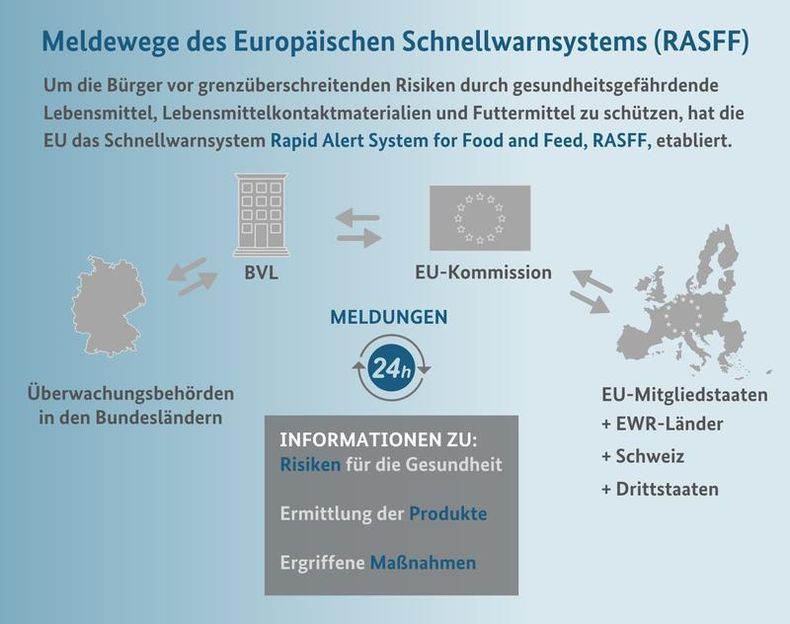Listeria in frozen vegetables and melamine in bamboo dishes
Report from the European Rapid Alert System for Food and Feed 2018
Information on more than 3,600 cases was exchanged last year through the European Rapid Alert System for Food and Feed (RASFF). Thanks to the network of authorities, an international outbreak of listeriosis, for example, could be cleared up and bamboo dishes with a hazardous amount of melamine could be taken off the market. "Last year's figures show how important a European network is for maintaining a high level of food safety in times of cross-border trade," said Dr Helmut Tschiersky, President of the Federal Office of consumer protection and Food Safety (BVL). "The European authorities are working very closely, quickly and successfully together in the RASFF."
With the aid of the RASFF rapid alert system, the states of the European Union and associated countries have been informing each other for 40 years about potentially hazardous food, feed and food contact materials such as crockery, cutlery or packaging. In 2018, 926 of all RASFF reports were related to Germany. Warnings about nuts and nut products were particularly frequent (16.2% of all notifications), followed by fruit and vegetables (13.7%) and food supplements, dietary and fortified foods (8.9%).
In over 30% of the notifications, a potential health hazard from micro-organisms such as salmonella and listeria was identified. Mould poisons (14,7 %) and a hazardous composition (8,2 %), such as unauthorised ingredients, were also frequent reasons for exchanging information through the European network.
14.8 % of the products mentioned in the reports relating to Germany came from the Federal Republic itself. This was followed by China (8.3%) and Turkey (8.0%). A large proportion of Chinese products were food contact materials, which were criticised for transferring undesirable substances from the material into food. The products coming from Turkey were mostly already complained about and rejected at the European external borders and thus did not reach the European market. This was particularly the case for fruit, vegetables and nuts, which were often found to contain mould poisons.
Listeria in frozen vegetables in
2018, the European Rapid Alert System RASFF was also used to detect a food-borne outbreak of disease. Last year, the European Commission drew the attention of the EU Member States to an accumulation of listeriosis diseases in several European countries.
In January 2018, Finland first informed the other countries of the network about a finding of Listeria monocytogenes in frozen maize. The corn, as well as other contaminated frozen vegetables, came from Hungary. From there, the maize was delivered to companies in several countries where it was further processed into various products. These processed products in turn were sold in more than 80 countries worldwide.
After the initial Finnish notification, more than 300 other notifications from all over Europe and from the European Food Safety Authority (EFSA) followed. They all contributed to reconstructing the supply routes of maize, removing the affected products from the market and thus preventing further infections.
Melamine in bamboo tableware
In addition to food and feed, the RASFF is also used to exchange information on food contact materials such as packaging, cutlery and tableware. If they pose a risk to the health of consumers, e.g. through the transfer of harmful ingredients from the material to the food, a notification to the rapid alert system shall be inserted.
Tableware made of bamboo fibres, especially for children, has been very present on the German market for several years. In the year 2018 bamboo plates were complained about due to an official market control in Germany. In this case, the migration limits for melamine were exceeded, i.e. an unacceptable transition from melamine from plastic to food took place. Moreover, the presentation of the product suggested that it was made exclusively from bamboo fibres and maize starch. It was not apparent to the consumer that a significant proportion of the plates consisted of the plastic melamine-formaldehyde resin.
As the product in question was also sold online, the central office of the federal states for the control of Internet trade "G@ZIELT" located at the BVL became active. With their help, online retailers in Germany and Great Britain could also be identified in addition to stationary sales. This information was shared with the other European countries via the RASFF, so that the corresponding measures could also be taken there.
From notification to recall
As a national RASFF contact point, the Federal Office of Consumer Protection and Food Safety (BVL) receives all notifications from the rapid alert system. If a hazardous product has reached Germany, the BVL checks the notification and forwards it to the responsible monitoring authorities in the federal states.
On the spot, the authorities approach the companies concerned. All necessary measures, such as a public recall, will be taken to ensure that the product is withdrawn from the market as soon as possible and that consumers are protected.
If, in the meantime, it turns out that other countries have been supplied with the product, this will also be communicated via the RASFF. In addition to the actual message, additional information on distribution channels and analysis results is shared across the network.
In addition to the European Commission, the European Food Safety Authority (EFSA) and the EFTA Surveillance Authority (ESA), 32 countries are now members of the RASFF network, including all EU Member States and Norway, Switzerland, Liechtenstein and Iceland as associated countries. In Germany, the Federal Office of Consumer Protection and Food Safety (BVL) acts as the national contact point and ensures the exchange of information 24 hours a day, seven days a week.

Reporting channels RASFF
BVL
Note: This article has been translated using a computer system without human intervention. LUMITOS offers these automatic translations to present a wider range of current news. Since this article has been translated with automatic translation, it is possible that it contains errors in vocabulary, syntax or grammar. The original article in German can be found here.
Other news from the department business & finance
Most read news
More news from our other portals
See the theme worlds for related content
Topic world Food safety
Food safety is at the heart of the food and beverage industry. It ensures that the food we eat every day is not only nutritious, but also free of harmful contaminants. From field to plate, the industry monitors and regulates every step of the process with strict quality controls, advanced testing methods and continuous research.

Topic world Food safety
Food safety is at the heart of the food and beverage industry. It ensures that the food we eat every day is not only nutritious, but also free of harmful contaminants. From field to plate, the industry monitors and regulates every step of the process with strict quality controls, advanced testing methods and continuous research.

























































